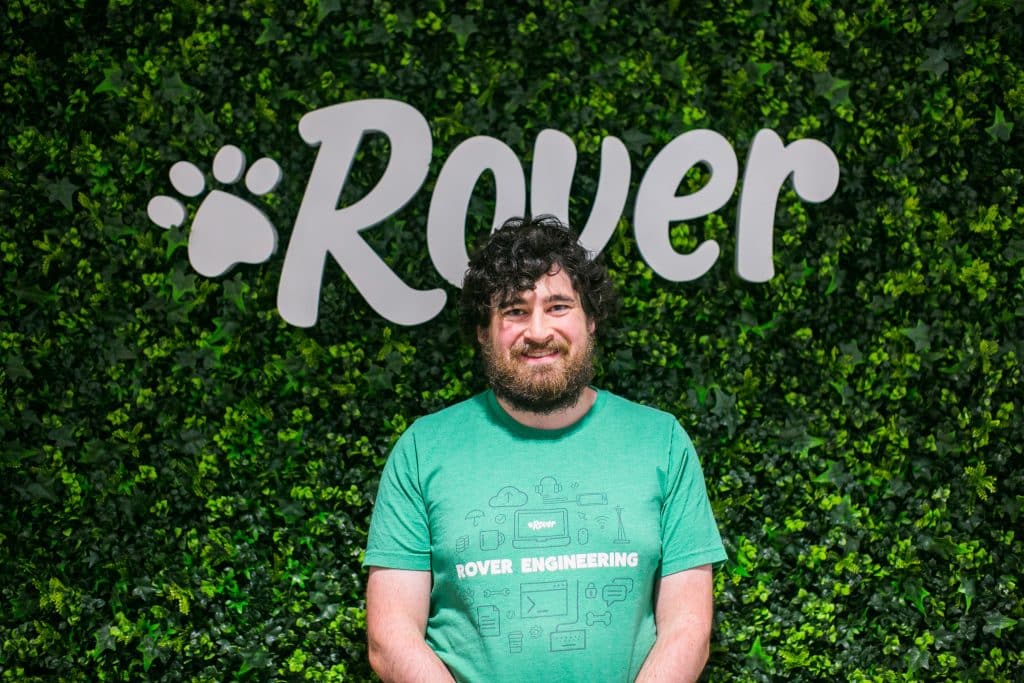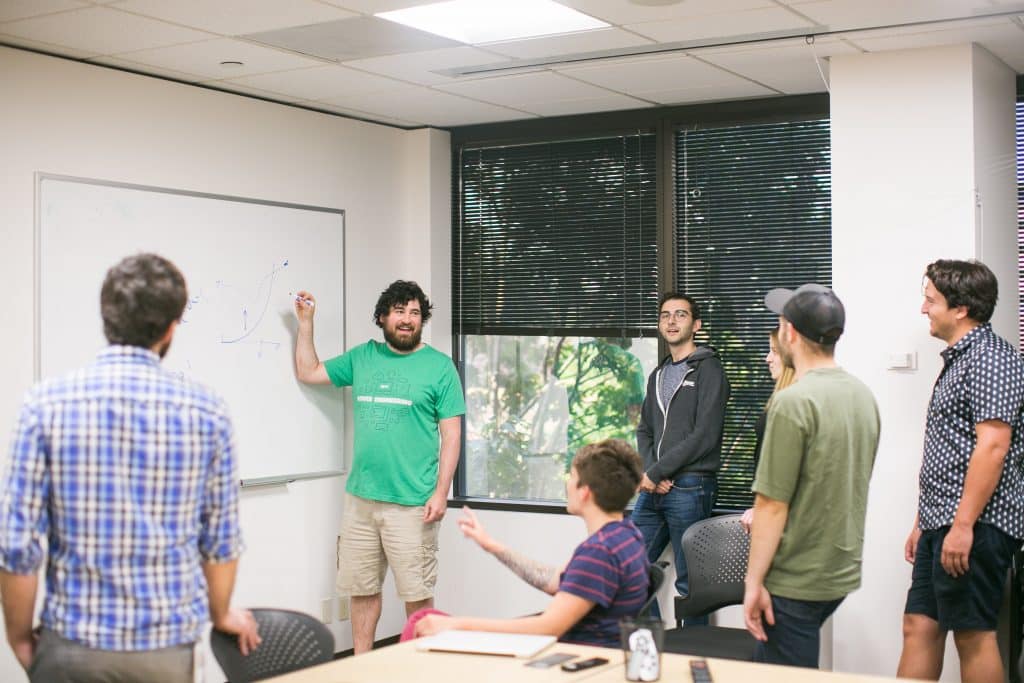Editor’s Note:
This is the fifth post in a series of interviews with our team of engineers at Rover. We introduce you to a Rover engineer, share their daily work and give you a peek into what it’s like to work for Rover. If you’re interested in an engineering career at Rover, check out the current Engineering positions.
As an engineering manager, Johann drives impact and delivers business value by starting new teams, technologies and business lines.
What do you do as a Rover engineer?
Heller: I’ve been at Rover for a little over five years. A big part of my role at Rover has been starting new teams and technologies with aggressive timelines. I was part of the launch for our on-demand product, Rover Now, I led the team for launching internationally and now I work on adjacencies, which is creating new business lines like our grooming offering.
How do you start your day?
Heller: I work remotely from Montana so I can get started and achieve a few things before a lot of the folks are in the office. First, I go through communication channels like Slack, email and Lever, which is our hiring tool, and then I have stand-up every morning at 9am with my team. A big focus of my role is coordination, communication, keeping people on the same page and making sure we are marching toward the same goal.
How do you work across teams at Rover?
Heller: I work with the product team on high-level scoping of projects. I like to direct them to what’s the problem we’re trying to solve and what’s the technology we can use to solve that. My hope is that I can solve their problems more efficiently than they had thought. In terms of how we get the actual work done, Rover also has a pretty strong work-from-home culture, with a lot of the engineers working from home one day per week. All of the technologies we utilize are supportive of remote work, too.
What’s your favorite thing about working at Rover?
Heller: I love the self-directed aspect of the teams. When I first started as a Rover engineer, we had a five-person engineering team. Those old processes stop working when you hit more than 100 employees, so we’ve had to change our process and technologies along the way. Rather than that change being directed top down from our CTO or directors, if a team member identifies something as a challenge, they’re empowered to go and solve that. I’ve really enjoyed taking advantage of that and seeing others do so as well. We have a culture of engineers driving forward the thing that they care about and we enjoy much better outcomes this way.
We’re also highly focused on measurable impact that keeps everyone aligned on being data driven. It extends to things that people may not have previously thought you could be data driven about, such as the safety of dogs. A lot of companies talk about being data driven and you find that it’s really focused on core funnel conversion rates or marketing spend. We’re data driven out to customer satisfaction and dog safety levels.
“We’re also highly focused on measurable impact that keeps everyone aligned on being data driven. It extends to things that people may not have previously thought you could be data driven about, such as the safety of dogs.”
How do you feel you make an impact in your role?
Heller: As a manager, a big part of how I can be impactful is by removing roadblocks for my engineers to ensure they can write code and deliver value. I make sure that we have projects to work on that are ready to go and have been scoped out well. An important part of that is providing them with context on our business goals. Engineers make a lot of small choices throughout their day that can impact things down the road. Giving them context as to why we are doing things helps them make the right choices in those small decisions.
I also really strive to make sure the projects that we work on meet the criteria of impact. I ask stakeholders to point to metrics that will change or value that will be added to our business or customer base. Being able to show that off helps invigorate the engineers and keep them motivated. A big part of having impact is by moving quickly and a trick to moving quickly is by doing less. A big part of my job is doing less by focusing on what is most impactful.
What excites you about your role?
Heller: I really like delivering new products at Rover. It’s exciting when there’s such a clear business need or desire from our customers and I’m able to deliver that technically. Projects I’ve launched have resulted in real businesses and it’s very satisfying to know that I was the person who planted that seed initially.
Tell me about a recent project you worked on that impacted Rover’s customers or your team?
Heller: One exciting project that I worked on earlier this year was our international expansion. We identified that we wanted to expand internationally in February 2018 and then we set a really aggressive timeline of launching to sitters in early June and owners in early July. We had to make some hard choices to move swiftly. For example, we decided not to translate to the site into the Queen’s English and we launched with dog weight listed in pounds and not kilos, since we found it was not a barrier for our customers. Our thought process was that if we move quickly, we can deliver that value to customers and then iterate. That’s a big thing about being agile as a software engineer. We met both those deadlines which was pretty exciting to take a company international in such a short time.
What’s a technology you are especially excited about and why?
Heller: I’m very interested in machine learning, particularly using algorithm enhancement. Especially in the natural language processing world, since we have a lot of messages that customers send across Rover every day. It would be interesting to add more value to our platform by programmatically understanding what those messages are about. For example, if a user sends a message that they’re going to be late to pick up their dog, could we do anything more to facilitate that communication if we understand that’s what they’re saying? How can we improve our product so that the communication can be smooth? There are an infinite amount of opportunities to utilize machine learning to better understand how our customers interact with our product and provide technology solutions to those challenges.
What’s your favorite meeting at Rover?
Heller: Tech & Treats is a weekly meeting that I love for its democratized learning experience. It’s an opportunity for anyone in the tech organization to present something they’ve learned, what they’re working on, or what they’re changing in terms of process or technology. I always learn a ton from these meetings! A team recently presented on the future of our data platform. It’s not something I interact with on a daily basis but it was super interesting.
Are you a mentor or mentee?
Heller: I am very much mentored by others at Rover, especially by other engineering managers. Since I was not an engineering manager before I joined Rover, there was a lot of room for improvement for me. On the technical side, I learn new things every day. That’s one of the things that excites me about my job. I work with a lot of engineers who are very talented so when they show off implementation plans or I review their code, I always get a new perspective or learn a new way to do things.
In terms of me mentoring others, I help engineers find and use their voice to drive change at Rover. I’m a big fan of defining and asserting process to run the business more smoothly and with impact. One of the things that I work on is giving them the tools that they need to have that voice.
What are some of your passions outside of work?
Heller: I live in Montana so I have an advantage to be outdoorsy and a bit of a woodsman. I like camping a lot in the summer. I also do woodworking and build furniture. I snowmobile in the wintertime and go ATV-ing in the summertime when I have time to get up there. I just bought a house so I’ve been doing a lot of home do-it-yourself projects!


